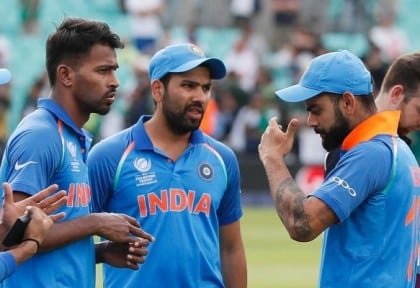India has long had an enviable batting line-up, but it needs similar talent and the X-Factor in its bowling department
So, first things first: a big pat on the back to the Pakistan cricket team for standing up tall in the ICC Champions Trophy Final.

Enroute pummelling the Indian team into defeat, they started the match with an evident intent to be aggressive in their approach. They sustained this attitude throughout. It was heartening to see the jubilation of the Pakistan players. They were the underdogs coming into the final but through sheer determination and grit, they outclassed a star-studded Indian line-up.
However, once you look beyond this result and try and cast a cricketing opinion about these two cricketing nations, it becomes evident that it is a tale of two long-running uncertainties – the inherent unpredictability associated with Pakistan cricketing teams, and the lack of bowling prowess in the Indian ranks.
There is a lesson to be learnt in every defeat. For India, it is obvious: batting line-ups may win you matches but a potent bowling attack will win you tournaments – a sentiment echoed by Pakistan bowling coach Azhar Mahmood in a recent interview.
India only lost two games in the 2017 Champions Trophy, one against Sri Lanka during the group stage, and the other one being the final. The strong Indian batting line-up fired against Sri Lanka with a 300-plus score, only to be let down by their bowling effort.
Sri Lanka conquered the 300-plus total with relative ease. The final against Pakistan revealed the flip side: a determined Pakistan batting outfit saw off an erratic Indian bowling endeavour to post a mighty target (339) that crushed the much-touted Indian batting big wigs.
Batting line-ups, no matter how strong, are prone to failure every now and then. Indian cricket has historically had a tendency to rely heavily on its batting line-ups to win big matches, and more often than not, this has held them back from winning title matches. Remember the 2003 ICC World Cup final against Australia, or the 2015 ICC World Cup semi-final against Australia? Just like the 2017 Champions Trophy final, they highlight the plight of the Indian team during contests in which their bowling attack was ruthlessly plundered. For all their repute, the Indian batters were not able to save the day in each of these high-profile matches.
India have a much improved bowling attack these days for the one-day format of the game. However, it is a competitive bowling outfit at best. It lacks the ‘X-Factor’ like the one characteristic of India’s batting. The Indian cricket team’s mindset seems to focus around winning matches by choking the opposition on an overdose of spin in the middle overs. But there is no Plan B, it seems, if the spin option was to fail or backfire (as it happened against Pakistan on 18 June 2017).
Teams like Pakistan, on the other hand, are bound to be surprise packages in big matches purely because of the bite in their bowling attacks.
Give them a handful of runs to defend and they turn on their wizardry with seam, swing, reverse swing, and brute pace. Their challenge remains the opposite of India – to find a consistent batting line-up.
For Indian cricket, and its energetic and ambitious leader Virat Kohli, the focus has to be on unearthing young, freak, fast bowlers, and nurturing them into match winners. Kohli’s team has pulled India out of the shadow of being a poor fielding unit. Indian cricket teams these days are fit, athletic, and excellent fielding sides. Similarly, Kohli must exert his leadership to arm the Indian cricket team with a formidable pace bowling attack – something that has never been associated with Indian teams throughout the history of the game.
Let’s hope that the guardians of Indian cricket wake up to this reality, for if they don’t, Indian fans will have to rely on prayer more than performance to win those big matches.





